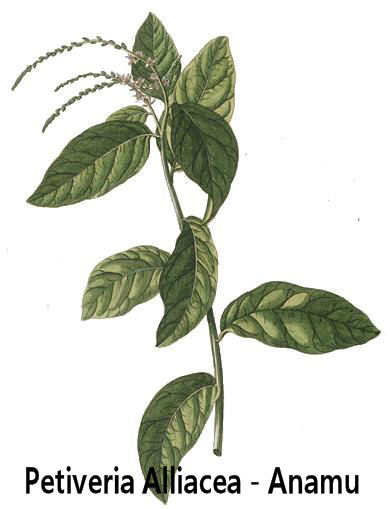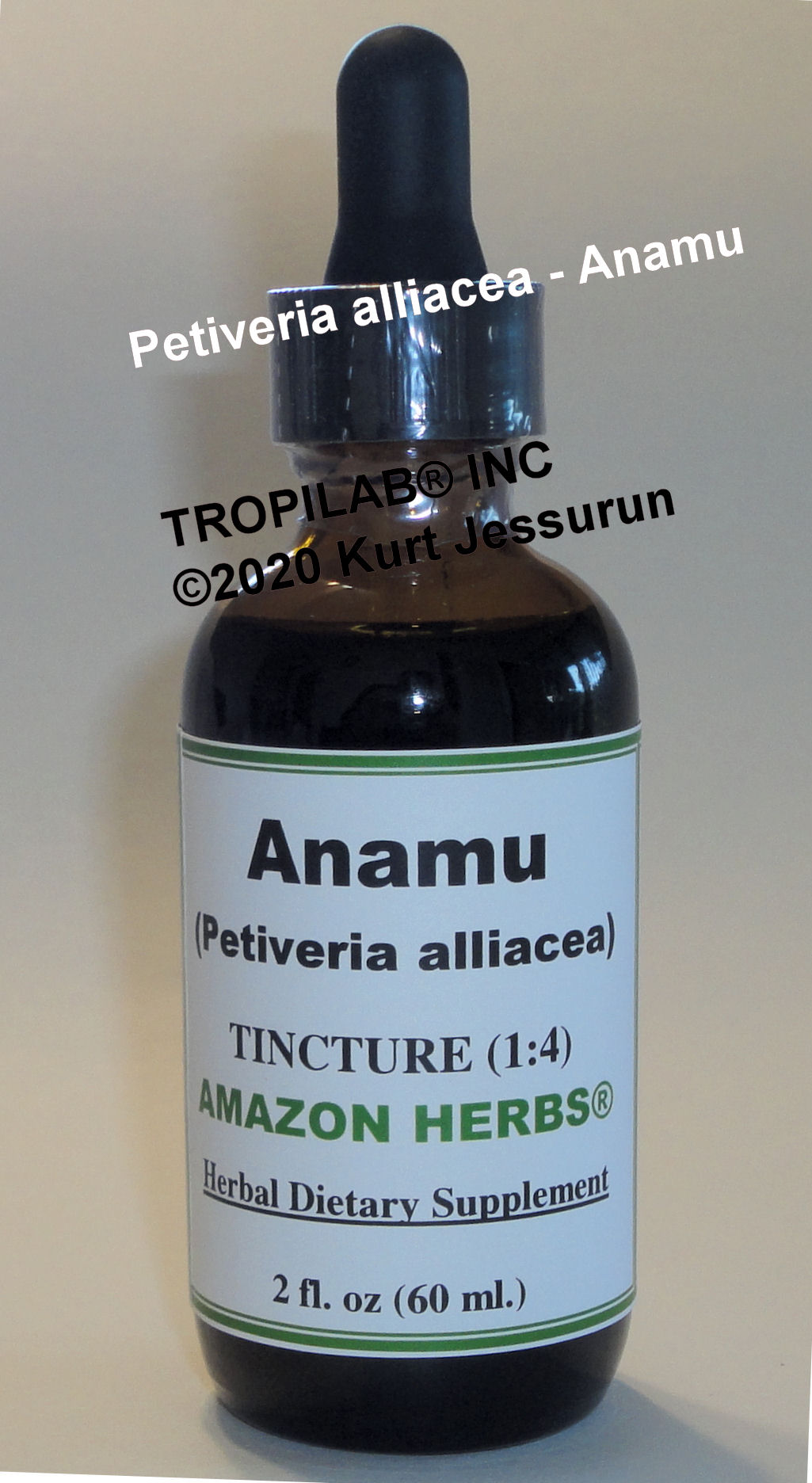
Overview
A low growing herbaceous shrub with many health benefits, indigenous to the Amazon rainforest.
The whole plant has a strong garlic odor.
In the Amazon it is traditionally used for many medicinal applications and in some magic rituals.
Used for many purposes such as boosting immunity (immunostimulant), fighting cancers, reducing inflammation, alleviate pain and as
an antioxidant.
Used also for its antimicrobial properties against bacteria, viruses, yeast, and fungi, as well as supporting the immune system
in general.
Constituents
Flavonoids, triterpenes, steroids, and sulfur compounds (dibenzyl trisulfide), astilbin, benzaldehyde,
benzoic acid, tannins, coumarin.
 Pharmacology
Pharmacology
Dibenzyl trisulfide, an active compound in anamu has anticancerous actions. It also contains the
phytochemicals astilbin, benzaldehyde, and coumarin; all three have been documented with antitumorous and/or anticancerous
properties.
Several phytochemicals in P. alliacea such as astilbin and dibenzyl trisulphide have been documented to directly kill
cancer cells.
Compounds in this plant were able to target the cancerous cells but left healthy, normal cells unharmed. Also, other phytochemicals
in this plant stimulate the body's natural defense system.
Dibenzyl trisulfide exhibited anti-proliferation and cytotoxic activity on a broad range of cancer cell lines (some cell lines with
up to 100% mortality!) and with almost no toxicity to healthy cells.
Due to the immunostimulant properties, the immune system increases production of lymphocytes (type of white blood cell)
and natural disease-destroying cells. The production of interferon (group of signaling proteins) and interleukins
(glycoproteins) which are produced naturally by the immune system itself in fighting cancers and infections, is increased.
Ethanol extracts of anamu retarded the growth of leukemia cells and other strains of cancerous tumor cells.
In South America, anamu is being used for its immune stimulant and anticancerous properties to support aid
for cancer and leukemia patients.
In Nigeria and other African countries, Anamu is a herbal remedy for sickle cell anemia.
Warnings & Side effects
Use of this plant can stimulate contractions of the uterus which may result in miscarriage.
The counarin in this plant is a blood thinner and should not be used by persons on blood thinning
medications such as warfarin.
Dosage
Tincture: 2 times daily, 1 - 2 ml each time.
Reference
A Systematic Review of the Traditional and Medicinal Uses of Petiveria alliacea L. in the Treatment of Chronic
Diseases
Randle MM, Riley CK, Williams LAD and Watson CT.
Scientific Research Council, Product Research and Development Division, Kingston 6, Jamaica, West Indies
2 University of Technology, College of Health Sciences, Kingston 6, Jamaica, West Indies.
Anti-Sickling Actions
Ameh, S., et al.
"Traditional herbal management of sickle cell anemia: lessons from Nigeria." Anemia. 2012; 2012:607436.
Immunomodulatory effects of aqueous and organic fractions from Petiveria alliacea on human dendritic cells.
Santander, S., et al.
" Am J Chin Med. 2012;40(4):833-44
Life's immunity as a normal distribution function: philosophies for the use of dibenzyl trisulphide in immunity
enhancement and life extension.
Williams, L.
West Indian Med J. 2010 Oct;59(5):455.
The above presentation is for informational and educational purposes only.
It is based on scientific studies (human, animal, or in vitro), clinical experience, or traditional usage.
For many of the conditions discussed, treatment with prescribed (RX) or over - the - counter medication (OTC) is also
available.
Consult your doctor, practitioner, and/or pharmacist for any health problem and before using
dietary supplements or before making any changes in prescribed medications.
|

